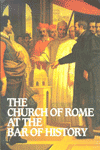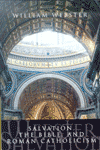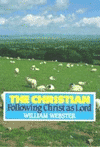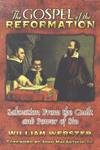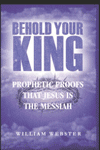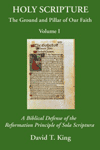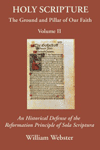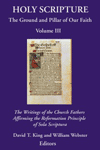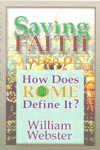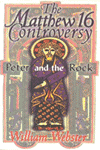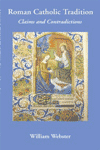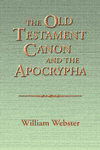Book Resources
Books authored by William Webster
These resources can be obtained by contacting Bill Webster
at [email protected], by phone at 360-687-7311 or purchased online.
Books Published by Banner of Truth
The Church of Rome at the Bar of History
In this book, William Webster, a former Roman Catholic, examines the authority claims and salvation teachings of Roman Catholicism from an historical as well as biblical basis and demonstrates their incompatability with Scripture, the early Church fathers and the facts of history. The work involves an extensive patristic analysis of Roman Catholic Tradition dealing with such subjects as sola Scriptura, The Formation of the Canon, The Papacy, Mary, The Sacramental System, Purgatory, Faith and Justification and is a validation of the fundamental principles of the Reformation. Here is an answer to the misrepresentation of truth by Karl Keating, Scott Hahn and others.
Salvation, the Bible and Roman Catholicism
Have the basic doctrines of the Roman Catholic Church changed since the 16th century Reformation? This is what many Protestants and even Roman Catholics think. This book deals with the salvation teachings of Roman Catholicism and demonstrates that the Church of Rome still officially promotes the same sacramental-works oriented salvation protested against by the Reformers.
The Christian: Following Christ as Lord
What is the nature of true conversion and sanctification? What does it mean to know and to follow Jesus Christ? What did Jesus mean when he called men to become His disciple? The Lord Jesus lived by certain unalterable principles which are meant to be present in the life of every believer. This book clarifies the meaning of true Christianity by explaining these principles through a careful exposition of the Scriptures, the teaching of Jesus, and by reference to the writings of major theologians such as Jonathan Edwards, John Owen, Martyn Lloyd-Jones, J.I. Packer, A.W. Tozer, J.C. Ryle and many others. Chapter titles include: The Nature of True Conversion, Living for the Glory of God, Worship, Holiness, The Life of Faith, Communion with God and Love.
Books Published by Christian Resources
The Gospel of the Reformation
Salvation from the Guilt and Power of Sin
What is the gospel? What does Scripture mean by salvation? What gospel has been consistently taught by the Reformers and those following in their steps? Such fundamental questions are addressed in this book. In a day when the essential message of the gospel is being assaulted by either legalism or antinomianism, evangelical Protestantism, which claims the heritage of the Reformation, is in danger of repudiating its history by embracing a gospel that fundamentally denies the message of the Reformers. Debates on Roman Catholicism and lordship salvation underscore the rampant confusion within evangelicalism over the precise meaning of salvation, justification and saving faith. This book clarifies the issues by clearly setting forth the biblical and Reformation teachings of the gospel and salvation.
Foreword by John MacArthur: I Ifirst became familiar with William Webster’s work almost a decade ago, through a tremendous little book entitled Must Jesus Be Lord to Be Savior? I greatly appreciated that work, which was a very perceptive expose of antinomian tendencies within modern evangelicalism.
Over the years I have eagerly read other books from Bill Webster’s pen and have come to view him as a valiant fellow–soldier in the battle for the clarity and simplicity of the true gospel. I have especially appreciated his tireless efforts to defend the doctrine of justification by faith.
Justification by faith has two bitter enemies. Antinomianism is an abuse of justification by faith, taking this doctrine to the extreme of denying any role for good works whatsoever in the life of the person who is saved. That error downplays the role of sanctification in the saving work of God and tends to turn the grace of God into licentiousness (cf. Jude 4).
But at the opposite end of the spectrum lies the sort of doctrine that makes the redeemed one’s personal holiness the ground of justification. This in effect nullifies the biblical doctrine of justification by faith alone, because it makes something good in the sinner the reason God accepts that person as righteous. It is essentially a denial that Christ’s own perfect righteousness, imputed to the believer, is sufficient for full justification (cf. Rom. 4:1–8). This error is at the heart of the Roman Catholic system.
William Webster, a former Roman Catholic himself, has studied Catholic doctrine carefully, meticulously. He has demonstrated rather definitively in other works that the Roman Catholic Church of today is actually at odds with her own history. But even more important, he sees clearly where Roman Catholicism is at odds with the plain truth of Scripture, and that is what this book is all about.
Webster is deeply concerned, as I am, by the modern push for ecumenical union between Roman Catholics and evangelicals. He understands that no such union can occur until the two groups agree on what Scripture teaches about the gospel. And since the chief differences between Roman Catholicism and historic Protestantism have always been major differences about the gospel, ecumenical unity cannot occur unless these crucial truths are downplayed or deemed nonessential. That is too high a price. Thankfully, William Webster sees the gospel as something worth defending, controversy or no.
Nonetheless this book is written in a gracious and irenic tone, utterly devoid of the kind of uncharitable invective and fiery emotion that have soured so many against most discussions of Catholic–Protestant differences. Webster makes his arguments with clarity, with biblical precision, and with an evident love for those with whom he disagrees. That is why this is such a powerful book.
I recommend this book to anyone—Catholic and Protestant alike—who wants to have a clearer understanding of gospel truth. As you read this work, may your spiritual eyes be opened as never before to the bright light of the gospel of God’s grace.
Must Jesus Be Lord to Be Savior?
What is a true Christian? What is the nature of repentance and faith Is Lordship-salvation biblical or is it a distortion of the gospel given to the Church by Jesus Christ? When Jesus enunciated his conditions for discipleship what did he mean? Was he calling men and women who were already believers to a deeper commitment or was he setting forth conditions for entering the kingdom of God? Is lordship a denial or an affirmation of the gospel of the Reformation? To answer these questions the author examines the controversy surrounding Lordship-salvation in light of the teaching of Jesus Christ and that of eminent evangelical theologians from the past and present: John Calvin, Martyn Lloyd-Jones, Charles Spurgeon, John Stott, J.I. Packer, John Murray, A.W. Tozer, Charles Hodge, A.A. Hodge, R.L. Dabney, James Montgomery Boice, A.W. Pink, John Gerstner, Augustus Strong, Henry Thiessen, William Hendriksen and others. This book provides a definitive answer to the lordship controversy. First published in 1986, this work has been revised and updated.
Behold Your King
Prophetic Proofs That Jesus is the Messiah
In Behold Your King, William Webster examines the historical evidence for the fulfillment of Old Testament prophecy in the life of Jesus, prophecies written hundreds of years before his birth. Behold Your King provides one of the most extensive documentations of Jewish interpretation of messianic prophecy in the English language, from the Talmud, Targums, Midrash and Rabbinic sources, proving that the primary New Testament teachings concerning the Messiah are supported by these ancient Jewish writings. A careful and honest examination of the historical facts can lead us to only one conclusion: Jesus Christ is the long promised Messiah, the Son of God, the Savior and King of all nations.
Holy Scripture: The Ground and Pillar of Our Faith – Volumes I, II, III
A Biblical and Historical Defense of the Reformation principle of Sola Scriptura. Endorsements by John MacArthur, J. Ligon Duncan, Joel Beeke, Jay Adams, Tom Nettles, Edward Donnelly, James White.
Holy Scripture – Volume I
by David King
In this Volume, David King provides a biblical defense of sola Scriptura. He sets forth the positive teaching of Scripture regarding itself, convincingly demonstrating that Scripture teaches its own sufficiency as God’s revelation, and possessing the innate ability to communicate clearly and understandably the necessary truths for faith and morals for every Christian. He systematically addresses and answers the Roman Catholic arguments against sola Scriptura.
David King is a graduate of Reformed Theological Seminary in Jackson, Mississippi.
Holy Scripture – Volume II
by William Webster
This Volume addresses the common historical arguments against sola Scriptura, demonstrating that the principle is, in fact, eminently historical, finding support in ‘the unanimous consent of the fathers.’ This volume also provides a detailed examination of the question of the canon from the time of Christ to the Reformation in which he answers the spurious arguments of Roman apologists that the Church of Rome infallibly established the canon in the fourth century.
Holy Scripture – Volume III
William Webster and David King, Editors
This volume is a compilation of the teaching of the Church fathers on the primacy, sufficiency and ultimate authority of Scripture. It contains one of the most extensive documentations of the patristic understanding of Scripture in the English language brought together in one volume.
Saving Faith: How Does Rome Define It?
The ECT Accord (Evangelicals and Catholics Together) and ECT 2 (The Gift of Salvation) in the late 1990’s and many since that time have called for unity between the Roman Catholic and evangelical Churches on the basis of a shared faith. After all, we are told, Rome teaches that an individual is saved by faith. But does such a basis for unity really exist? When Rome states that an individual is saved by faith, what exactly does she mean? In this book, Mr. Webster documents the Roman Catholic teaching of saving faith from the official authoritative sources of the Roman Catholic magisterium. In a time of great confusion as to what Roman Catholicism officially stands for, this book helps clarify the issues. It provides extensive documentation from the writings of Roman Catholic theologian Ludwig Ott, Papal Decrees, The Council of Trent, Vatican I, Vatican II, The Code of Canon Law, The Question and Answer Catholic Catechism and the newly published Catechism of the Catholic Church.
The Matthew 16 Controversy: Peter and the Rock
This book is an overview of the historical development of the papacy and the relationship of the church of the patristic age to the bishops of Rome. This work provides the most extensive documentation of the patristic interpretation of the rock of Matthew 16 in the English language.
Foreword by Dr. Nettles: “William Webster has gathered the most formidable body of data concerning the interpreatation of the locus classicus of the authority of the Bishop of Rome to be found anywhere. In addition he has included the studied judgments of a large number of contemporary scholars — Protestant, Catholic and Orthodox — concerning the historical treatment of the Matthew 16 passage. That the contemporary Roman Catholic interpretation had no place in the biblical understanding of the early church doctors cannot be disputed.” (Professor and Chairman, Department of Church History, Trinity Evangelical Divinity School, Deerfield, IL).
Roman Catholic Tradition: Claims and Contradictions
This book is an easy to read and fully documented summary of the historical and theological teachings of the Roman Catholic Church. It exposes the incompatibility of these teachings with Scripture, the Church fathers and the facts of history and provides a succinct refutation of the common claims of Roman Catholic Tradition. A good resource for witnessing to Roman Catholics or for helping Protestants to understand the essential differences between Protestantism and Roman Catholicism.
The Old Testament Canon and the Apocrypha
In this work, William Webster documents the history of the Old Testament canon and the Apocrypha from the Jewish age up to the time of the Reformation. The historical evidence conclusively demonstrates that the Jews did not accept the Apocrypha as part of the inspired corpus of the Old Testament, that many of the early Church fathers followed the Jewish canon in rejecting the Apocrypha, and that the Church throughout the middle ages, including the period of the Reformation itself, followed the opinion of Jerome in denying the Apocrypha full canonical status. The writings were considered useful for the purposes of edification and for reading in the churches but were not authoritative for the establishment of doctrine.
